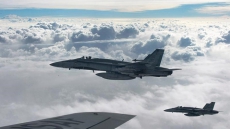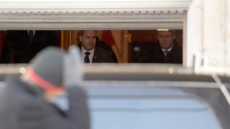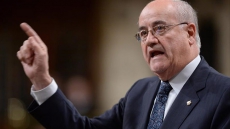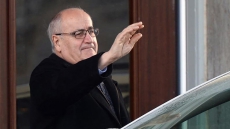TORONTO — The right of long-term expats to vote in federal elections goes before Ontario's top court Tuesday, as Ottawa fights a ruling that struck down part of Canadian voting laws.
Barring Canadians from voting — in this case those who have lived abroad for more than five years — is a justified restriction in a free and democratic society, the government argues.
"The residence limit to voting ensures the connection of the citizen to the place where he or she casts their vote," the government states in its factum.
"That is the social contract at the heart of our system of constitutional democracy."
In May last year, Ontario Superior Court Justice Michael Penny ruled parts of the Canada Elections Act — enacted in 1993 — were unconstitutional.
In doing so, he extended the vote to as many as one million Canadians living abroad — even though a sliver of that number would likely vote in, for example, this year's federal election.
For one thing, Penny ruled, expats may well be subject to Canadian tax and other laws. In addition, mass murderers have the right to vote, the judge noted, but not long-term expats, who "care deeply" about Canada.
Ottawa, which sought unsuccessfully to stay the ruling ahead of last June's byelections, insists non-resident Canadians need to have a "direct and meaningful" connection to Canada and their ridings in order to vote.
As such, it began enforcing the five-year rule under which long-term expats could only regain the right to vote by resuming residency in Canada — not by just visiting.
Two Canadians living in the United States launched the constitutional challenge after being denied a ballot in the 2011 federal election: Montreal-born Jamie Duong, 31, of Ithaca, N.Y., and Toronto-born Gillian Frank, 36, of Princeton, N.J., argued they had only left Canada for educational and employment opportunities.
Both said they — in common with many other expats — still have a strong attachment to Canada and a stake in its future.
"Five years is an arbitrary limit which has no bearing on a citizen's connection to Canada," they argue in their factum.
"If citizenship is not enough, the very act of voting evidences these individuals' connection to Canada."
The appeal to a "fictitious social contract" simply isn't enough to deny them their fundamental democratic rights, the factum states.
They also argue the Supreme Court of Canada has been "forceful" in refusing to strip voting rights from particular groups — such as prisoners — absent any specific concern.
"The respondents, who are proud Canadians with strong rights to our country, are entitled to the same unyielding protection."
Still, the government maintains, provinces, territories and other countries with similar electoral systems as well as their courts have found residency limits are "reasonable and justified."
New Zealanders, for example, lose the right to vote after three years of uninterrupted absence.
In all, expats pay annually an estimated $6 billion in income taxes to the Canadian treasury, despite using fewer resources than their in-country counterparts. Some long-term expats — among them members of the Armed Forces and diplomats — have always retained the right to vote by way of a "special" ballot.
The Appeal Court hearing is expected to take two days.





